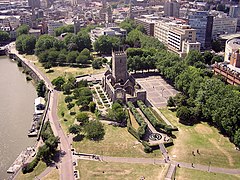Castle Park, Bristol
| Castle Park, Bristol | |
|---|---|

Western part of Castle Park, with ruined St Peter's church, garden and square in centre and Bristol Bridge in top left
|
|
| OS grid | ST592731 |
| Coordinates | 51°27′21″N 2°35′17″W / 51.4558°N 2.5881°WCoordinates: 51°27′21″N 2°35′17″W / 51.4558°N 2.5881°W |
Castle Park (sometimes referred to as Castle Green) is a public open space in Bristol, England, managed by Bristol City Council. It is bounded by the Floating Harbour and Castle Street to the south, Lower Castle Street to the east, and Broad Weir, Newgate and Wine Street to the north. Its western boundary is less obviously defined and has been the subject of controversy, perhaps because the area around High Street and St Mary-le-Port Church, though not part of the park and always intended for development, is often considered at the same time as the park. The park was completed and opened on 30 September 1978, and occupies most of the site which had contained Bristol's main shopping area. Much of this area was heavily damaged in the Blitz during the Second World War, and that which remained was subsequently demolished.
The ruined tower of St Mary-le-Port church stands to the west of the park, surrounded by derelict financial office buildings. Adjoining the ruins of St Peter's church in the middle of the park is a sensory herb garden, and five silver birch trees as a memorial to the beaches of the D-Day landings. To the east is a grassy arena, and the partially excavated remains of Bristol Castle with a preserved vaulted chamber. There is also a bandstand and a children's play area.
Tree-lined St Peter's Square, to the north of St Peter's church, has been home to various events including German Christmas markets. In recent summers a tethered balloon has been placed near the bandstand, offering ascents to sightseers.
Recent attempts to develop the area between the park's western edge and High Street have proved controversial; Bristol City Council are keen to replace derelict buildings with a mixed-use development to help reconnect the Old City to Broadmead and raise funds to improve the park; others would rather see the park extended to High Street.
The town of Bristol was settled at some time in the Anglo-Saxon period on the northern or Mercian side of a crossing point of the River Avon, at or near to the present Bristol Bridge. The town lay entirely between the Avon and the Frome, which at that time emerged into the Avon just downstream of Bristol Bridge.
...
Wikipedia

